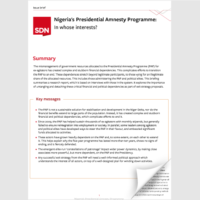April 2017-March 2020
Summary

SDN’s Niger Delta Stabilisation Programme works to increase public participation in the development and implementation of a range of initiatives across security, governance, economic diversification, and environmental issues in the Niger Delta region of Nigeria. These initiatives are designed to address the lack of inter-agency action in the Niger Delta, which has led to a breakdown in relations between the federal and state governments of Nigeria, and with citizens in the region, and seeks to meet the demand for innovative approaches to security and stabilisation in the short-term, whilst embedding structures for long-term stability.
The three years of the project can be broadly aligned to three phases which are:
- Field-based research to understand the context and engage with key stakeholders on what initiatives may be feasible and effective in promoting stability in the Niger Delta region.
- Testing, or ‘piloting’, initiatives that the first phase identified as the most feasible and effective in contributing towards security and stability.
- Securing the adoption, scale-up, and sustainability of piloted initiatives, and sharing recommendations based on SDN’s research, and pilot evaluation from phase one and two.
For the third phase, a range of stakeholders in the Government of Nigeria, the private sector, and international agencies and institutions will be the target of SDN’s advocacy approach.
Aims
This project will test strategic interventions, not included in current policy approaches, with the aim of generating evidence for improved policy, supporting sustained peace and development in the Niger Delta. The interventions demonstrated will be for adoption, replication and scale-up by the government of Nigeria, private sector, and international actors.
Key activities
- Security
and governance
- Technical assistance to the Federal Government on the development and coordination of policies and projects for the Niger Delta
- Supporting the reconciliation and reintegration of former gang members and combatants, and providing alternative livelihood options (see below).
- Bring together organisations implementing successful reintegration approaches for former gang members across the region, to share and learn from one another.
- Mediation of long-term inter-community hostilities, periodically becoming violent.
- Report biannually on the public perceptions of security dynamics in the Niger Delta, and highlight trends over time.
- Economic
diversification
- Running the Ken Saro-Wiwa Innovation Hub, which provides the physical space, equipment, and training to increase the number of young people skilled up to compete in the global digital economy and make a livelihood in the largest urban centre of the Niger Delta, Port Harcourt City.
- Pilot safe and decent livelihoods in areas of few opportunities, where some people turn to illicit activities to create a livelihood, such as artisanal oil refining.
- Securing investment for the scale-up and sustainability of piloted initiatives from amongst a range of stakeholders in the Government of Nigeria, the private sector, and international agencies and institutions.
- Facilitating dialogue between civil society groups and the government on clean-up and remediation of oil impacted areas, and demonstrating effective implementation mechanisms to improve government approaches.
Context
Many grievances in the Niger Delta have a long history but haven’t been resolved. There are also serious political, security, economic, and development problems in the Niger Delta. These factors combine to trigger cycles of conflict, often violent and sometimes destroying whole communities.
These cycles of conflict have lengthened and worsened over the last 30 years, and although open conflict between militants and governments has stopped since 2016, the region is seen to be locked in an endless cycle of low-intensity violence and conflict. The relationship between government and citizens has also worsened due to a perceived lack of action by the Federal and State governments to meet various political, economic, and development needs.
Read more about the Niger Delta’s history, key issues, and conflict drivers.
Related news and updates

SPDC-funded development projects need to mainstream climate resilience

Help us contribute to social and economic growth in the Niger Delta through technology and innovation
Webinar: Dirty fuels in Nigeria

Press release: Dirty diesel, petrol, and kerosene; the toxic trio for Nigerians’ lungs and livelihoods.

Project resources
Funders and partners

Published: 11.12.2019




